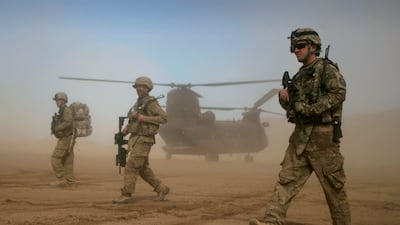“History repeats itself in the tragedy of Afghanistan,” stated many headlines, this August, in reaction to the Taliban’s storming of the presidential palace and occupation of Kabul.
Images of a Chinook airlifting Americans out of their Afghan embassy have prompted comparisons to the fall of Saigon to the North Vietnamese in 1975. The Taliban are set to announce the establishment of a new Islamic Emirate of Afghanistan as the 20th anniversary of the 9/11 attacks approaches in September.
The historic enormity of the Taliban’s victory and the US’s chaotic withdrawal from Afghanistan makes the publication of First Casualty: The Untold Story of the Battle that Began the War in Afghanistan, by Toby Harnden, even more poignant.
Harnden, a former naval officer, foreign correspondent for UK newspapers The Sunday Times and The Telegraph and Orwell Prize winner, has spent decades reporting on war zones, including in Zimbabwe and Northern Ireland.
His new book tells the story of how America, its allies and the Afghan government have tried and failed to resist the Taliban. The book does this by exploring the experiences of the first CIA and Green Beret Special Forces troops sent to Afghanistan in the aftermath of the 9/11 attacks to aid the Northern Alliance, a coalition of Tajiks, Uzbeks, Hazaras and Turkmen, in the north of the country.

Harnden focuses on the relationship between the CIA’s Team Alpha, the first Americans behind the Taliban’s lines, and Abdul Rashid Dostum, a charismatic and fearsome Afghan warlord and Northern Alliance commander who fought for the Soviets and the mujahideen resistance during the Soviet-Afghan War (1979-1989).
Within Team Alpha, First Casualty gives the most attention to David Tyson, an ex-academic, CIA case officer and Central Asian linguist; and Mike Spann, a paramilitary CIA officer and ex-marine. Tyson embodies the eccentric, adaptive and intellectual spies found in John le Carre novels. Spann comes across as an all-American southerner with a guerilla fighter’s mindset.
Harnden seems to see Spann and Tyson, the exemplary agent and expert, as representative of the successful lighter-touch US intervention pursued immediately after 9/11.
“First Casualty is the story of Team Alpha, a group of eight Americans who became the first to fight behind enemy lines after 9/11. It is a rousing tale of the remarkable success they achieved when, for perhaps six weeks, the CIA ran the war. These men brought regional expertise, languages, and a focus on tribal dynamics and human psychology,” writes Harnden.
In contrast, he blames the Pentagon, former vice president Dick Cheney, former US defence secretary Donald Rumsfeld, and former deputy defence secretary Paul Wolfowitz, for having a “Cold War mindset". He also argues that plans to invade Iraq became a constant distraction in meetings with the president.
First Casualty notes that the Pentagon briefed against CIA efforts and was reluctant to use small groups of special forces and later insisted on sending in senior officers not trusted by Dostum and other Northern Alliance commanders.

Harnden writes that while junior Green Beret officers, who were the first to co-ordinate with the Northern Alliance, had the attitude “that Dostum was in charge and the Green Berets were advisers”, other senior officers “seemed to treat Dostum as a subordinate”.
Yet, Team Alpha, along with a small group of Green Berets, in the first months after 9/11, had great success working alongside the Northern Alliance. Within weeks of landing in 2001, they had recaptured the northern town of Mazar-i-Sharif, an outpost of anti-extremist resistance.
However, Mazar-i-Sharif fell to the Taliban again on August 15 this year. Team Alpha’s lightning-speed victories in northern Afghanistan, according to Harnden, were due, in part, to the Afghan “practice of switching sides ... to survive.”
This allowed the CIA to capture numerous Al Qaeda suspects who were imprisoned in Qala-i-Jangi, a 19th-century fort built to defend against British invaders during the Second Anglo-Afghan War (1879-1880).
However, several ex-Taliban commanders betrayed the Northern Alliance at the last minute, and Spann was killed in the resulting prisoner uprising. He became the first American casualty in a war that would last for another 20 years.
The trend of fluid and changing allegiances has played out again in 2021 with Afghan government officials and army officers making deals with the Taliban, which allowed the insurgents to rapidly advance towards Kabul.
The historic success of insurgents in Afghanistan was recognised at the time by CIA director George Tenet, who stressed that according to Harnden, “Americans would be insurgents rather than invaders, helping Afghans rid their country of the foreign occupiers of Al Qaeda”.
However, this quickly ended as “conventional troops poured into the country and fortified bases were established". This, according to First Casualty, led to “western standards of morality and fair play [being] applied, even retrospectively, as the US tried to create a nation in its own image. Early success became a long-drawn-out failure.”
For Harnden, the initial CIA mission into Afghanistan is ultimately “an inspiring story of what was achieved then, and a plaintive one of what might have been since”.

